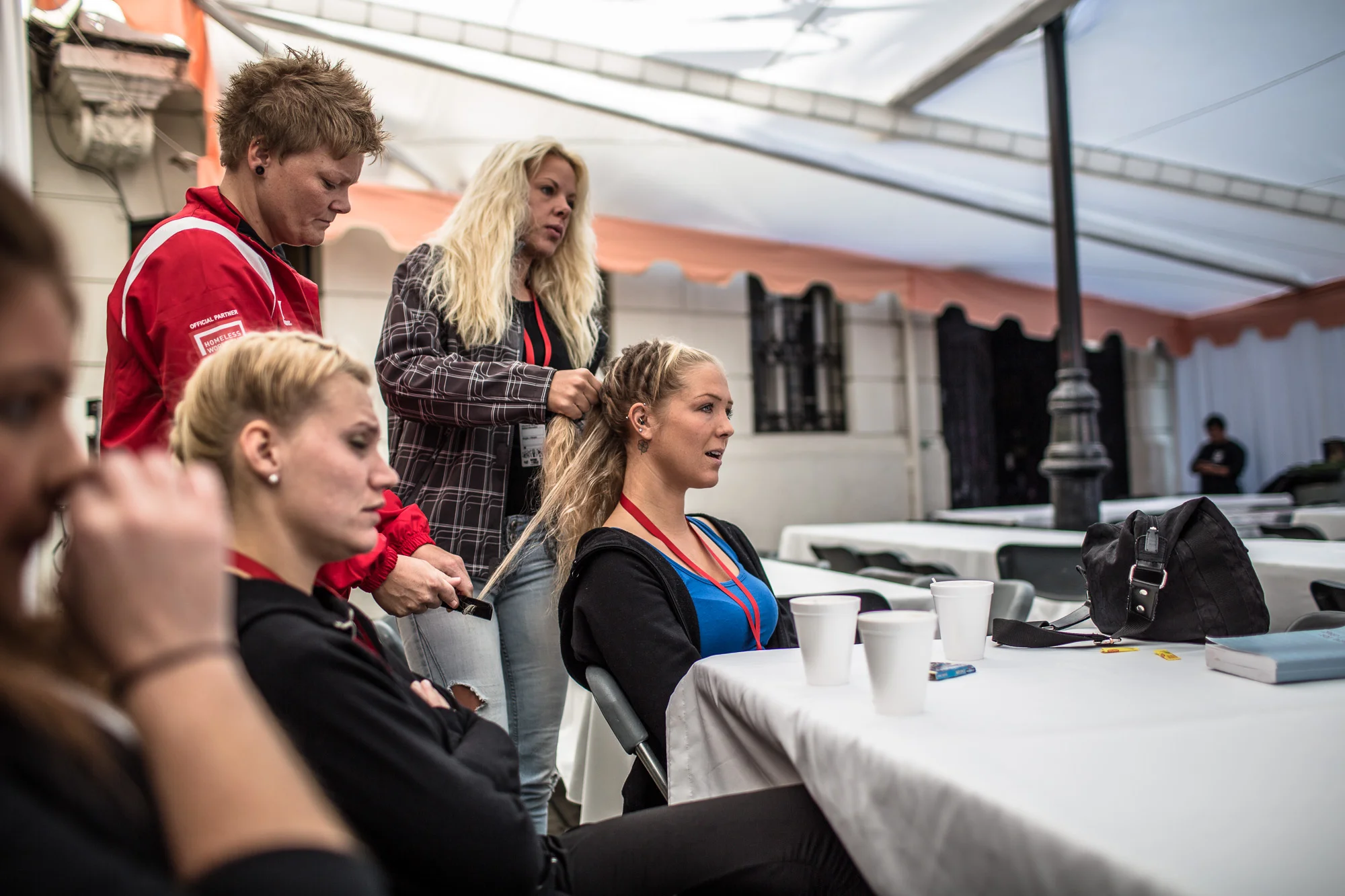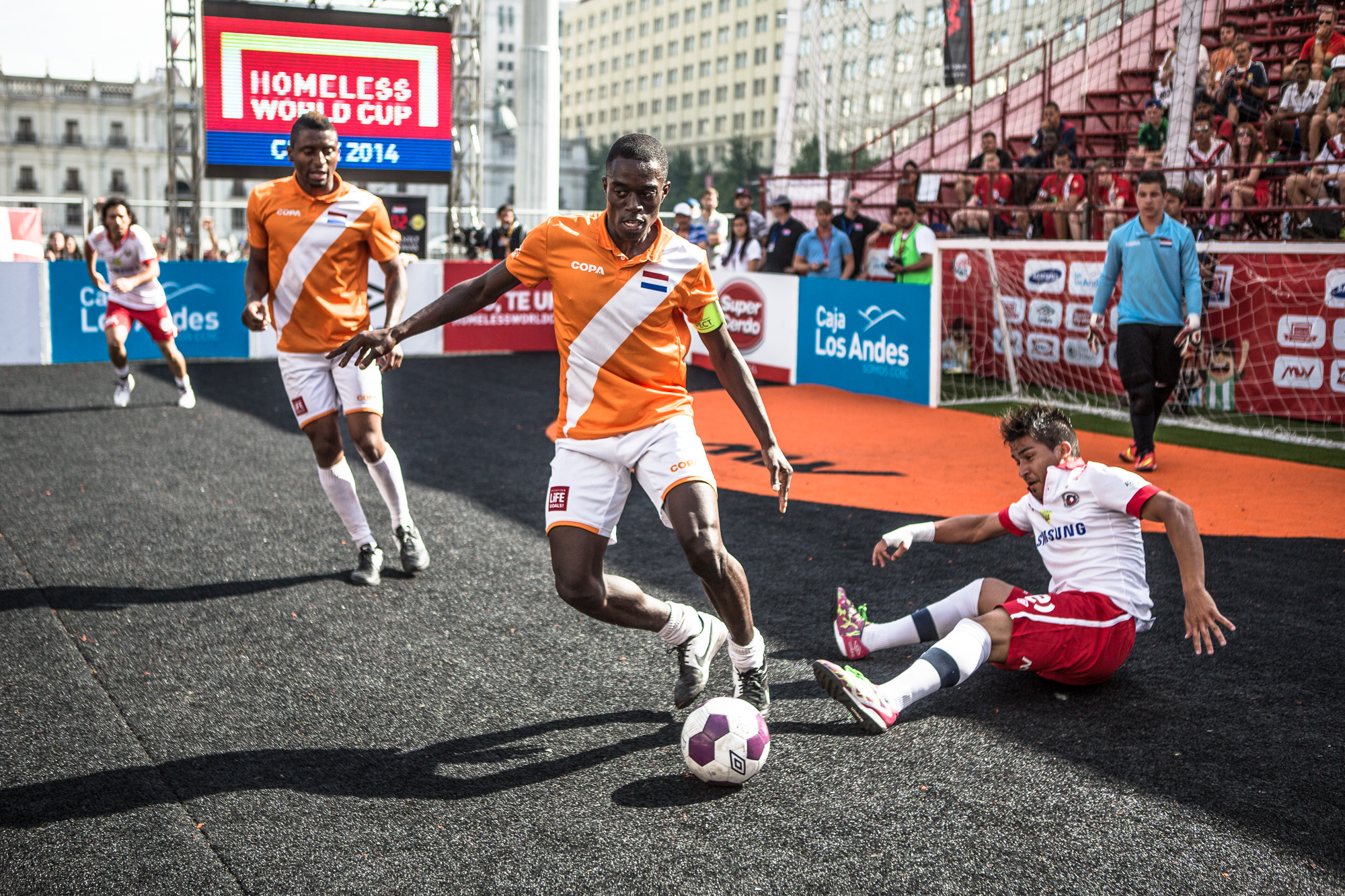




















Mensah 18 watches pensively as his team play in the final stages of the Homeless World Cup, in Santiago, Chile. The Ghanaian winger has had a long trip from his home country via South Africa and Brazil to get to Santiago but that is not the only journey he has been on. Mensah was given the opportunity to represent his country by the manager of the Ghana Homeless World Cup team and believes that he has not only developed as a player but also as a person. "I am here to make my family proud" says Mensah who has 3 younger siblings. "We are facing some financial problems back home, but me coming here is not just for me. It's for the people of Ghana". Mensah lives his life for the beautiful game commenting that he "eats, sleeps, and drinks football". But he is not just confident in his footballing achievements, and he carries his school certificates wherever he goes.

Workers race to construct the large viewing stands around one of the three pitches in Plaza de la Ciudadanía, central Santiago that will play host to the Homeless World Cup. In only a couple of days, the stands will be packed with hundreds of fans, as the teams and event volunteers from around the world arrive in the bustling south American city.

Players from Mexico's national team cheer as their women counterparts score a goal in the final stages of the Homeless World Cup in Santiago, Chile. The tournament allows countries to bring mixed/men’s and women’s teams but much depends on financial constraints to determine how many players and coaches they can afford to send.

Pitches of the homeless world cup tournament located in Plaza de la Ciudadanía, home to the presidential place in the Central Business District. The compact pitches of street soccer of 22m x 16 meters allow the tournament to be located in unusual, sometimes iconic, central setting something very unique to the sport. This not only raises awareness of the charity, but also challenges spectators perceptions of homelessness, as many who stop to watch the games are often shocked to learn that all of the skilled players taking part have at one stage been homeless themselves.

Players from Norway women’s team, prepare for one of their first games at the opening stages of the tournament. Although an extremely fast paced schedule, there is still time for the players, many of whom will have not left their native countries before, to explore the local area as well as talk with other players from all over the globe. Unlike Argentina and the USA, who fielded mixed teams, Norway had the funding and players available to bring both a womans and Mens side.

A player from team Netherlands tackles his Chilean opponent in the quarter finals of the tournament. Although these games are highly competitive with the players desperate to win the title, the ethos of the tournament is in the forefront of everyone’s minds. If a foul is committed, the player will make sure to pick up his opponent, and make amends before play continues. It is the indescribable camaraderie that adds to this competitions unique and inspiring nature. The commonality shared by all players shines through in all areas of life both on and off the pitch, with lack of animosity between even the most politically hostile countries.

Team Ghana at the welcoming ceremony of the tournament. After travelling over 40 hours via South Africa as well as Brazil to reach Chile’s capital Santiago, the Ghanaian team were eager to jump straight into the action. Meeting and greeting their counterparts, confident of their achievements and representing their country. GIMAT volunteer network is the partner charity which manages the Ghanaian team through its work supporting street children, orphans, school drop-outs and the disabled.

A player from team Ghana, with his marker drawn number 7, sits amongst his team pitch-side after a match. While some teams will have been able to obtain sponsors for kit as well as travel costs to participate in the tournament, other will not. Ghana only just managed to attend with enough players to compete, meaning other areas, such as kit were not a priority. Each nation depends on its own charitable donations to fund teams who can attend. For some nations this process is easier than others.

Darragh from the Republic of Ireland takes time out in the busy schedule of play to call home in a nearby café. With 350 fast paced games to get through within a week, play sometimes continues until after dark, with the teams passionately battling for points. Unlike other tournaments, it is not a knock out competition through the group stages, meaning team have to be prepared mentally and physically to play every day.

Crowds gather in one of large viewing stands to watch the whirlwind games. People from all walks of life, young and old, from the local street cleaner and shop owners, to high ranking military officers came to enjoy the atmosphere. However, unlike premiership football matches, the crowd would cheer on both teams, understanding the nature of the tournament and the pride and passion that the players felt to be representing their country.

Winning team Chile celebrate their victory in the 12 Homeless World Cup in this years host nation, Santiago, Chile. Finalist Chile and Bosnia are amongst the 42 nations taking part in this year’s, year 12, Homeless World Cup in Santiago, Chile. The street soccer style tournament for homeless men, women and youth ran from Sunday, October 19 through to today’s final on Sunday, October 26. Street Soccer organisations currently operate in 74 nations across the world with an accumulative reach of 100,000 each year. The Homeless World Cup is the final stage of the year-long programmes offering an alternative to a life of isolation, gangs, addictions and homelessness.

Mensah 18, sits in the medical area receiving care from a team physio before being taken to hospital with a torn ligament. Upset not because of the extreme pain, but for the thought of letting his team down by not being able to play for the remainder of the competition. Most of the workforce providing the logistical, media, journalistic, and medial support are all volunteers. Many will have given up their time, sometimes using holiday leave, to travel across the world to work non-stop for this charitable organisation for the week, to ensure its undeniable success.

After the singing on national anthems, the Brazilian team huddle on the pitch right before kick-off. The unseasonably hot weather during the tournament, meant that extra care had to be taken to hydrate the players. As the competition is global in scale, the host nation changes each year. This can sometimes raise logistical problems in certain cities, be it from low level corruption, petty theft, or security issues, all of which the organising team have to deal with and mitigate. However this has never been an insurmountable problem as is evidenced by the diverse range of nations visited by this tournament along with the many success stories from the individuals who pass through it.

Lafrence, team Namibia’s captain leads their warm up. Unlike other teams which will stick to traditional techniques, Namibia’s warm-up is more akin to traditional African dance. With the captain leading, they parade up one side of the event area with many spectators drawn to watch. What stands out about the players from all of the nations, is the professionalism and devotion that they exude to the point that it is hard for a spectator to envisage the huge difficulties many will have faced with their past. As Mel Young co-founder of the charity states “people coming from different countries in the world from miles apart, but they are bonded together because they were homeless and excluded and they understand where each other are coming from and that’s what brings them together.”

Team India beat Switzerland 4-2 Harash Vadan, India’s number 10, scored a hat-trick making for a very emotional win.

Chilian Ladies team psych themselves up for the final, huddling and chanting local football songs much like their professional counterparts. The final games of the tournament were broadcast on prime time Chilean television, bringing in an enormous audience to watch the fast paced penultimate games. Emotions and adrenalin were running high as the presence of mass media brought an extra element of pressure and eagerness for the players to grip the title.

A player from the men’s Netherlands team consoles his female counterpart after the women lost out to Brazil in the quarter-finals. There is an enormous amount of camaraderie and emotional attachment both within national teams and their competitors. All want to win, bit in a sense they are all winners, having already been chosen to represent their country. As all ultimately have been working to achieve a higher personal goal that surpasses even the importance of this competition.

Players from both Chile and Brazil celebrate Chile’s win in the final of the Homeless World Cup. As the whistle was blown, this Chilean player grabbed his young daughter, to share in the celebrations of victory. The sense of empowerment on the faces of both the winning and losing team was overwhelming.

Luis a general Chilean handyman and local assistant for the event is overcome with emotion as he embraces the Chilean captain after their victory in the final. Being a fanatical street football fan, he travelled to Santiago purely in order to participate in the running of the event. With next to no english skills, he endeared himself to everybody becoming one of the unofficial faces of the week long tournament. With big ambitions for the future, he hopes to learn full English, and move to Europe to start his own street football organisation.

The Chilean woman’s team celebrate winning the 12th annual Homeless World Cup in Santiago, Chile. With mixed emotions from disbelief to sheer elation, the woman share their victory with the crowd and thousands of television viewers. The impact to peoples lives goes far beyond the duration of the tournament, not just for the players, but the spectators, and volunteers also. Stereotypes of homelessness are crushed as anyone who talks to, comes into contact, or reads about the players are amazed by their personal stories, sometimes too difficult to even comprehend. However their fortitude and strength in the face of adversity, empowers others to achieve their aims and re-evaluate their own lives.
